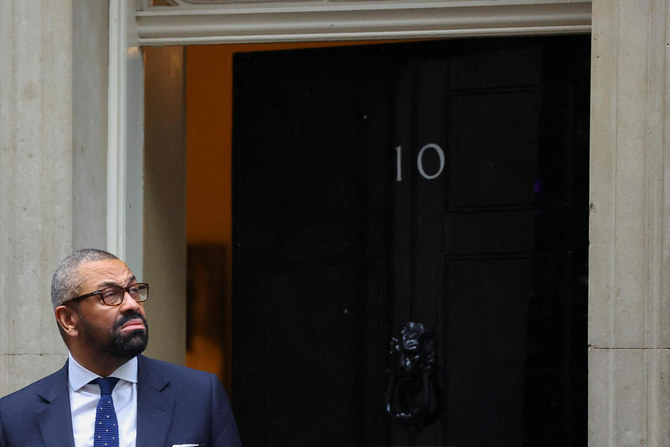
The British woman has been caught in a legal storm since July, when the alleged rape took place in an Ayia Napa hotel
LONDON: Women’s rights campaigners marched through London on Monday to protest against the treatment in Cyprus of a British teenager convicted of “lying” after she accused a group of Israeli men of gang rape.
The march started at the Cypriot Embassy, where dozens of protesters held signs calling for boycotts of Cyprus. A huge banner read: “This is not justice. Overturn the conviction. Let her come home.”
When the march reached Downing Street, chants of “justice” were directed at the British government, which the protesters accuse of not doing enough to support the 19-year-old teenager, who has not been named for legal reasons.
On Tuesday, she was handed a four-month suspended sentence after Judge Michalis Papathanasiou convicted her of falsely accusing the Israelis of gang rape.
The British woman has been caught in a legal storm since July, when the alleged rape took place in an Ayia Napa hotel.
She said she had been raped by up to a dozen Israeli men on July 17. Twelve men were arrested and taken into Cypriot police custody, but they were freed just 10 days later.
When the British teenager signed a retraction, she was charged with lying. Her legal battle had just begun.
The Israelis, by contrast, celebrated with relatives outside Famagusta police headquarters, hugging their loved ones and dancing with joy.
The scenes of revelry continued at Israel’s Ben Gurion airport, where some of the boys were filmed cracking open bottles of champagne and chanting: “The Brit is a whore.”
But in a jail cell in Cyprus, a British woman was forced to reflect upon the legal whirlwind that had taken place around her — a nightmare that campaigners and rights groups say displays a shocking, sexist injustice.
The British Foreign Office broke convention by publicly criticizing another country’s legal system, declaring the case “deeply distressing.”
Ahead of her sentencing this week, Foreign Secretary Dominic Raab said he had “serious concerns” about her treatment.
Following the suspended sentence, Raab said he was “relieved” that the teenager could now begin the “process of recovery,” as she returned to the UK on Tuesday night.
But protesters in Cyprus, Britain and Israel have the Cypriot legal system in their sights as they campaign to end what they perceive to be a grave injustice.
Jenn Selby, a candidate for the Women’s Equality Party in the UK, told Arab News that the case was “a blatant miscarriage of justice.”
She said: “The treatment of the young woman … has been utterly appalling. She claims Cypriot police coerced her into withdrawing her allegations of rape, without a lawyer and in violation of her human rights.”
Selby added: “She was then subjected to a trial in which the judge refused to hear any evidence about whether the rape actually took place, ignored expert testimony and physical and video evidence that supports her claims, and accused her of inventing her story because she was ashamed. This isn’t justice, this is a sham.”
Susana Pavlou, director at the Mediterranean Institute of Gender Studies in Cyprus, said the case has instigated a “culture of protest” in the country.
“This year it has been revealed how broken our criminal justice system is — broadly in terms of police and social services response to violence against women, and the lack of specialist services,” she added.
“It’s heartening to see how this has ignited women’s rights campaigners and a women’s rights movement focusing on this issue. This isn’t going to go away. We won’t be silenced.”
The teenager’s lawyer, Lewis Power QC, said the case is “not finished by any means.” He added: “We will be seeking an expedited appeal to the Supreme Court of Cyprus, and we will also be considering going to the European Court of Human Rights.”
He said: “We do not feel we have had justice in terms of how the trial progressed, the manner in which it was conducted, the initial police investigation, and the fact that we feel she did not receive a fair trial.”
Power added that the appeal to the Supreme Court will begin “in the next few days,” but expressed concern that it could face lengthy delays because “the wheels of justice move very slowly in Cyprus.”
Campaigners say Cypriot authorities wasted no time in labeling the British teenager a liar, fantasist and criminal.
Legal group Justice Abroad said the trial was unfair because Papathanasiou refused to consider whether she had actually been assaulted.
Her legal team said the teenager’s confession, extracted after eight hours of police questioning, was the product of coercion.
The defense said the poor English demonstrated that the “highly educated” teenager had not written it.
Papathanasiou, in his sentencing remarks, said he had “decided to give her a second chance” after “all the evidence shows that she had lied.”
Many say she never had a first chance. Dr. Marios Matsakis, a forensic pathologist, testified that he was convinced that “violence was exercised” during the incident. He said bruising on her body was “consistent with rape having taken place.”
Papathanasiou was not interested. Referring to the questionable confession, he said: “Her guilt is proven.”
Orit Sulitzeanu, head of the Association of Rape Crisis Centers in Israel, said: “She is not to blame at all.” Sulitzeanu added: “This sentence reflects backward thinking and not understanding the dynamics of rape. The judge here must learn what happens to the victim of sexual abuse.”












